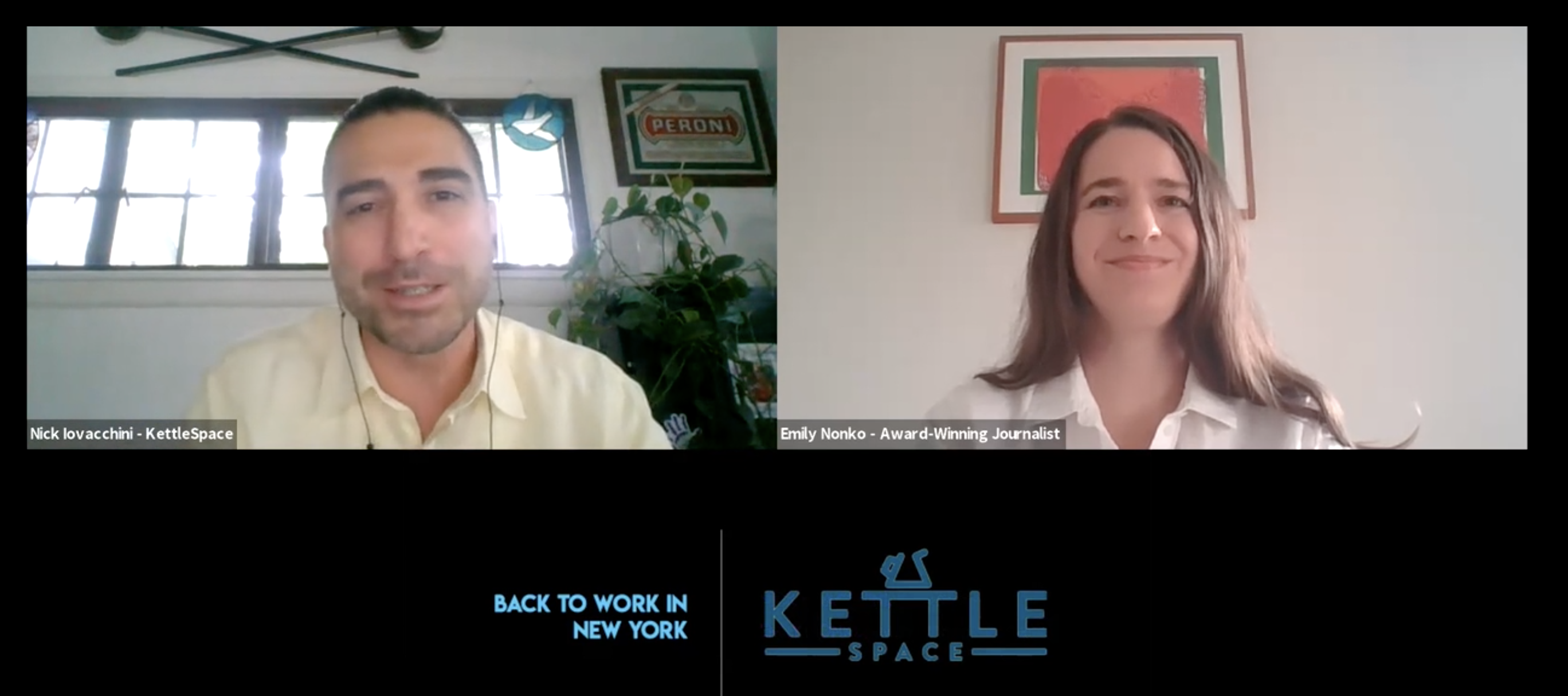The Future Workspace: What's in Store for Flexible Offices


The new breed of coworking business had only just launched when suddenly everything changed. In the first week of March, the New York company KettleSpace released its first mobile app. The company had developed a new model combining the best of traditional coworking with the flexibility of coffee shops, in which KettleSpace partners with leading hospitality brands to create a network of on-demand, perk-filled working and meeting spaces for its members.
Only two weeks later, hospitality and office spaces alike shuttered across the city due to COVID-19. “When we broke for business on March 13, we had about 20 locations open and thousands of paying members,” said CEO and co-founder Nick Iovacchini. “We made the decision to get in front [of the pandemic] and voluntarily cease all operations and pause all of our revenue, which was literally going from having a thriving business on the rise to having a business that couldn't function.”
The past six months have been a whirlwind and a challenge for the KettleSpace team. Iovacchini and I spoke for a From Day One webinar that not only looked at the unexpected evolution of his business, but what’s happening within the back-to-the-workplace process and how the pandemic has fundamentally changed the office and coworking industries.
The sudden halt in KettleSpace’s business offered the opportunity for Iovacchini (pronounced yo vah KEY knee) to become an expert in those matters. “We’ve been on the phone with hundreds–approaching 1,000–different people in company leadership about the return to work initiative,” he told me. “We’ve jumped in and are asking, What are you worried about? What are your people worried about? What are you thinking? And how can we be helpful?”

Iovacchini detailed several themes that have emerged. Safety is first and foremost. That’s followed by commuting concerns, and the evolving concept of a corporate headquarters. We’re thinking differently about how to be in workspaces. There’s “remote-ish,” as Iovacchini dubbed it–a combination of in-person and remote work. There’s the exploration of hub-and-spoke models with a primary office along with satellite offices closer to where people live. There’s the “episodic gatherer group,” those workers who need in-person time for collaborations, brainstorming and culture building. Finally, some workers are deemed “geo-independent,” in which they don't have to be tethered anymore to a specific city or office.
While many of us remain wary of returning to the office, surveys indicate that most would prefer a mix of working at home along with periodic visits to the workplace. Younger workers in particular favor a return to the office. “All of this is really balancing the idea that you have to do right by your employees and your team,” Iovacchini said, addressing company leaders weighing those decisions. “You also have to check the requisite boxes with your leadership team and your management team and the various stakeholders that the focus is on health and wellness. This has got to have an HR component, a financial component, a real-estate component. So that all has to be aligned–and it’s challenging.”
Providing space for employee concerns and challenges is crucial, he said, as well as maintaining extreme flexibility into an unpredictable future. The value of flexibility proved itself in KettleSpace’s own business evolution.
During the webinar, Iovacchini announced that KettleSpace has partnered with New York University to create safe, flexible spaces within walking distance from the school’s Brooklyn and Manhattan campuses. The company also built mobile app to integrate with NYU’s existing tech that allows students to reserve seats inside these spaces.
“The fun part of all this was, not only were we all in uncharted territory together, but we're also on a three-week timeline to get all of this done,” he said. “We were able to open hundreds of COVID-spaced workstations around campus as well track utilization based on their needs.”
It wasn't the type of partnership KettleSpace envisioned for itself in its founding. But it has proven that the flexibility of co-working will have plenty of value in the return-to-work phase. KettleSpace has started to reopen selected locations across New York City, where the company is taking extra safety precautions to protect everyone in their spaces. KettleSpace has updated its platform to require pre-registration and a health assessment before members can work in its locations.
KettleSpace hopes that its original partnerships with hospitality companies, which include restaurants, hotels, and other high-quality retail assets, could bring much-needed revenue into these businesses after COVID-19 dramatically reduced capacity. He also expects corporations will begin subsidizing individual co-work spaces for their workers, away from traditional offices.
And he believes that the mindset of legacy office landlords will have to change. “There is no playbook for this,” he said of working in the era of COVID-19. “You have to take on that lean startup methodology of: there's no playbook, but we're gonna go transparently and creatively to solve this. And I think that as a startup founder, that's something that's in our DNA.”
Editor's note: From Day One thanks our partner who sponsored this webinar: KettleSpace. Thank you as well to everyone who attended this webinar live. If you missed it, feel free to check out our replay here and visit our conference page to register for more upcoming events.
Emily Nonko is a Brooklyn, NY-based reporter who writes about real estate, architecture, urbanism and design. Her work has appeared in the Wall Street Journal, New York magazine, Curbed and other publications.
The From Day One Newsletter is a monthly roundup of articles, features, and editorials on innovative ways for companies to forge stronger relationships with their employees, customers, and communities.